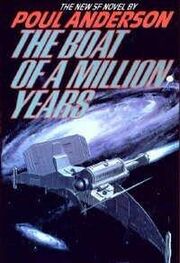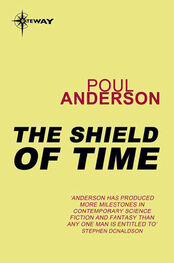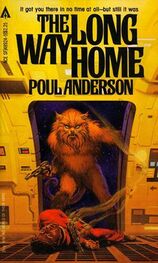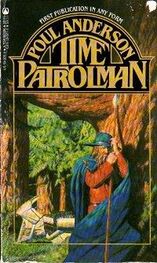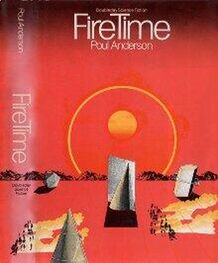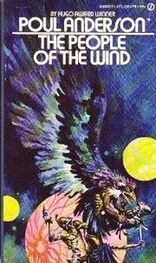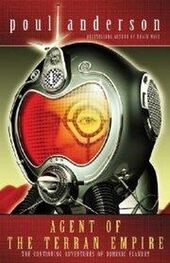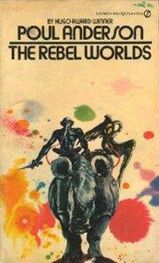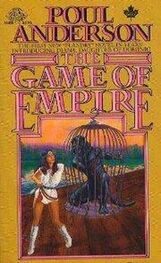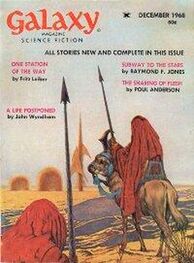The dark head shook. “I said you won’t underfand. We do not fear death for ourselves. But most of us have not yet had children. We do fear death for our bloodlines. We need to find a home, forgetting Kirkasant, and begin our families. You, though, you keep us on this barren search—why? For your own glory?”
He should have explained then. But the strain and weariness in him snapped: “You accepted my leadership. That makes me responsible for you, and I can’t be responsible if I don’t have command. You can endure another couple of weeks. That’s all it’ll take.”
And she should have answered that she knew his motives were good and wished simply to hear his reasons. But being the descendant of hunters and soldiers, she clicked heels together and flung back at him: “Very well, Ranger. I shall convey your word to my captain.”
She left, and did not again board Jaccavrie.
Later, after a sleepless “night,” Laure said, “Put me through to Makt’s navigator.”
“I wouldn’t advise that,” said the woman-voice of his ship.
“Why not?”
“I presume you want to make amends. Do you know how she—or her father, or her, young male shipmates that must be attracted to her—how they will react? They are alien to you, and under intense strain.”
“They’re human!”
Engines pulsed. Ventilators whispered. “Well?” said Laure.
“I’m not designed to compute about emotions, except on an elementary level,” Jaccavrie said. “But please recollect the diversity of mankind. On Reith, for example, ordinary peaceful men can fall into literally murderous rages. It happens so often that violence under those circumstances is not a crime in their law. A Talatto will be patient and cheerful in adversity, up to a certain point: after which he quits striving, contemplates his God, and waits to die. You can think of other cultures. And they are within the ambience of the Commonalty. How foreign might not the Kirkasanters be?”
“Urn-m-m—”
“I suggest you obtrude your presence on them as little as possible. That makes for the smallest probability of provoking some unforeseeable outburst. Once our task is completed, once we are bound home, the stress will be removed, and you can safely behave toward them as you like.”
“Well… you may be right.” Laure stared dull-eyed at a bulkhead. “I don’t know. I just don’t know.”
Before long, he was too busy to fret much. Jaccavrie went at his direction, finding planetary systems that belonged to various stellar types. In each he landed on an airless body, took analytical readings and mineral samples, and gave the larger worlds a cursory inspection from a distance.
He did not find, life. Not anywhere. He had expected that. In fact, he was confirming his whole guess about the inmost part of the cluster.
Here gravitation had concentrated dust and gas till the rate of star production became unbelievable. Each time the cluster passed through the clouds around galactic center and took on a new load of material, there must have been a spate of supernovae, several per century for a million years or more. He could not visualize what fury had raged; he scarcely dared put his estimate in numbers. Probably radiation had sterilized every abode of life for fifty light-years around. (Kirkasant must, therefore, lie farther out—which fitted in with what he had been told, that the interstellar medium was much denser in this core region than in the neighborhood of the vanished world.)
Nuclei had been cooked in stellar interiors, not the two, three, four star-generations which have preceded the majority of the normal galaxy—here, a typical atom might well have gone through a dozen successive supernova explosions. Transformation built on transformation. Hydrogen and helium remained the commonest elements, but only because of overwhelming initial abundance. Otherwise the lighter substances had mostly become rare. Planets were like nothing ever known before. Giant ones did not have thick shells of frozen water, nor did smaller ones have extensive silicate crusts. Carbon, oxygen, nitrogen, sodium, aluminum, calcium were all but lost among… iron, gold, mercury, tungsten, bismuth, uranium and transuranics—On some little spheres Laure dared not land. They radiated too fiercely. A heavily armored robot might someday set foot on them, but never a living organism.
The crew of Makt didn’t offer to help him. Irrational in his hurt, he didn’t ask them. Jaccavrie could carry on any essential communication with their captain and navigator. He toiled until he dropped, woke, fueled his body, and went back to work. Between stars, he made detailed analyses of his samples. That was tricky enough to keep his mind off Graydal. Minerals like these could have formed nowhere but in this witchy realm.
Finally the ships took orbit around a planet that had atmosphere. “Do you indeed wish to make entry there?”
the computer asked. “I would not recommend it.”
“You never recommend anything I want to do,” Laure grunted. “I know air adds an extra factor to reckon with. But I want to get some idea of element distribution at the surface of objects like that.” He rubbed bloodshot eyes. “It’ll be the last. Then we go home.”
“As you wish.” Did the artificial voice actually sigh? “But after this long time in space, you’ll have to batten things down for an aerodynamic landing.”
“No, I won’t. I’m taking the sled as usual. You’ll stay put.”
“You are being reckless. This isn’t an airless globe where I can orbit right above the mountaintops and see everything that might happen to you. Why, if I haven’t misgauged, the ionosphere is so charged that the sled radio can’t reach me.”
“Nothing’s likely to go wrong,” Laure said. “But should it, you can’t be spared. The Kirkasanters need you to conduct them safely out.”
“You heard your orders.” Laure proceeded to discuss certain basic precautions. Not that he felt they were necessary. His objective looked peaceful—dry, sterile, a stone spinning around a star.
Nevertheless, when he departed the main hatch and gunned his gravity sled to kill velocity, the view caught at his breath.
Around him reached the shining fog. Stars and stars were caught in it, illuminating caverns and tendrils, aureoled with many-colored fluorescences. Even as he looked, one such point, steely blue, multiplied its brilliance until the intensity hurt his eyes. Another nova. Every stage of stellar evolution was so richly represented that it was as if time itself had been compressed—cosmos, what an astrophysical laboratory!
(For unmanned, instruments, as a general rule. Human flesh couldn’t stand many months in a stretch of the cosmic radiation that sleeted through these spaces, the synchrotron and betatron and Cerenkov quanta that boiled from particles hurled in the gas across the intertwining magnetism of atoms and suns. Laure kept glanting at the cumulative exposure meter on his left wrist.)
The ‘solar disk was large and lurid orange. Despite thermostating in the sled, Laure felt its heat strike at him through the bubble and his own armor. A stepdown viewer revealed immense prominences licking flame-tongues across the sky, and a heartstoppingly beautiful corona. A Type K shouldn’t be that spectacular, but there were no normal stars in sight—not with this element distribution and infall.
Once the planet he was approaching had been farther out. But friction with the nebula, over gigayears, was causing it to spiral inward. Surface temperature wasn’t yet excessive, about 50° C., because the atmosphere was thin, mainly noble gases. The entire world hadn’t sufficient water to fill a decent lake. It rolled before him as a gloom little relieved by the reddish blots of gigantic dust storms. Refracted light made its air a fiery ring.
Читать дальше
